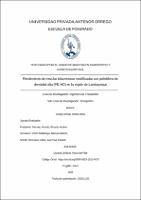Rendimiento de mezclas bituminosas modificadas con polietileno de densidad alta (PE-HD) en la región de Lambayeque
Abstract
Debido a la creciente producción y abandono de residuos plásticos, esta investigación buscó determinar el rendimiento de las mezclas bituminosas modificadas con Polietileno de Densidad Alta (PE-HD) en la región de Lambayeque. Para resolver esta cuestión se realizaron 155 briquetas de mezcla bituminosa modificada con PE-HD y se cuantificaron sus propiedades mecánicas a través del ensayo Marshall. Gracias a esto se pudo encontrar que los picos más altos de estabilidad se dieron con un porcentaje de asfalto de 5.66 % junto con 1.00 % de PE-HD. El promedio del flujo y porcentaje de vacíos de las briquetas fue de 3.17 mm y 4.17 % respectivamente, por lo que se encontraron estos datos dentro de la normativa nacional. Por lo tanto, se concluyó que la fórmula química del Polietileno de Densidad Alta (PE-HD) es (C2H4)n y que sus características químicas se encontraban dentro de los rangos requeridos para este tipo de material, además, se encontró que la más grande cantidad de material que se retuvo fue en el tamiz N°10 y luego en el tamiz N°04, asimismo, se halló que las características físicas de los áridos eran aptas para el uso en el asfalto pues cumplían con los mínimos y máximos mencionados en la norma peruana, además, a través del ensayo Marshall se encontró que la estabilidad, el flujo y el porcentaje de vacíos de las mezclas bituminosas en promedio disminuían mientras se aumentaba el porcentaje de PE-HD, en adición, al contrastar estadísticamente el rendimiento de las mezclas bituminosas modificadas con PE-HD y las mezclas asfálticas tradicionales se observó que en promedio la estabilidad se reduce un 11.86 %, el flujo aumenta un 1.54 % y el porcentaje de vacíos aumenta un 11.44 %, por último, el diseño de mezcla bituminosa con Polietileno de Densidad Alta en la región de Lambayeque que se propone es de 5.66 % de asfalto PEN 60/70 y PE-HD en un 5.00 % además de una combinación de compuestos áridos de 40.2 % de grava y 59.8 % de arena. Due to the increasing production and abandonment of plastic waste, this research sought to determine the performance of bituminous mixtures modified with high-density polyethylene (HDPE) in the Lambayeque region. To resolve this question, 155 briquettes of PE-HD modified bituminous mixes were made and their mechanical properties were quantified through the Marshall test. Thanks to this, it was found that the highest stability peaks occurred with an asphalt percentage of 5.66 % together with 1.00 % PE-HD. The average flow and void ratio of the briquettes was 3.17 mm and 4.17 % respectively, so these data were found to be within the national standard. Therefore, it was concluded that the chemical formula of High Density Polyethylene (PE-HD) is (C2H4)n and that its chemical characteristics were within the required ranges for this type of material, in addition, it was found that the largest amount of material that was retained was in the N°10 sieve and then in the N°04 sieve, also, it was found that the physical characteristics of the aggregates were suitable for use in asphalt as they complied with the minimum and maximum mentioned in the Peruvian standard, In addition, through the Marshall test, it was found that the stability, flow and percentage of voids of the bituminous mixes decreased on average as the percentage of PE-HD increased; in addition, when statistically contrasting the performance of the bituminous mixes modified with PE-HD and the traditional asphalt mixes, it was observed that on average the stability decreased by 11. 86 %, the flow increases by 1.54 % and the percentage of voids increases by 11.44 %, finally, the asphalt mix design with High Density Polyethylene in the Lambayeque region that is proposed is 5.66 % PEN 60/70 asphalt and PE-HD at 5.00 % in addition to a combination of aggregate compounds of 40.2 % gravel and 59.8 % sand.


